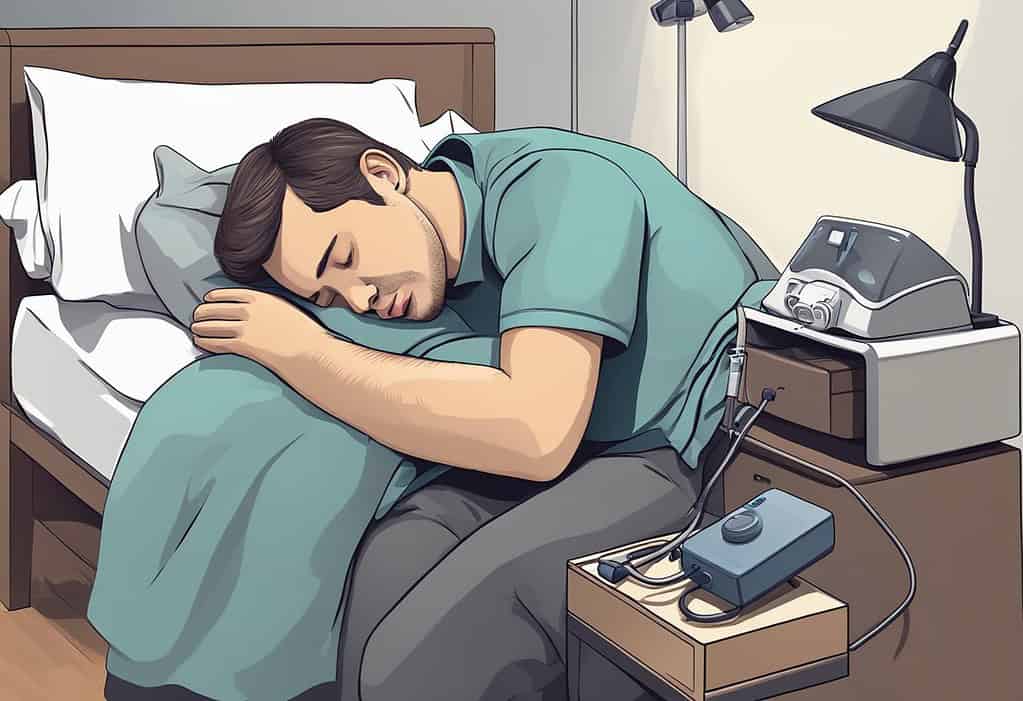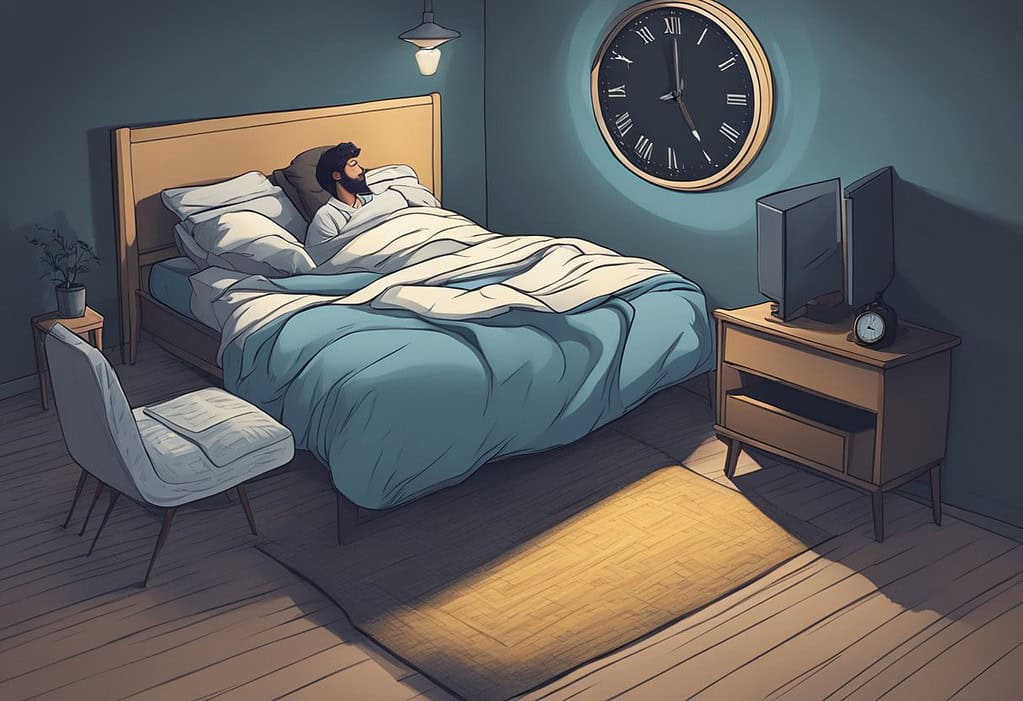Sleep apnea is a sleep disorder that affects millions of people worldwide. It is a condition where breathing stops and starts during sleep, leading to poor sleep quality and health complications. Sleep apnea can be a serious condition that requires proper diagnosis and treatment.
There are different types of sleep apnea, including obstructive sleep apnea, central sleep apnea, and complex sleep apnea. Each type has its own set of symptoms and causes, and treatment options may vary depending on the type and severity of the condition. It is important to recognize the signs of sleep apnea and seek medical advice if you suspect that you or a loved one may be suffering from this condition.
Key Takeaways
- Sleep apnea is a common sleep disorder that affects millions of people worldwide.
- Different types of sleep apnea exist, and each type has its own set of symptoms and causes.
- Proper diagnosis and treatment are essential to manage sleep apnea and improve overall health.
Types Of Sleep Apnea: More Than Just Snoring
Sleep apnea is a serious sleep disorder that affects millions of people worldwide. It is characterized by pauses in breathing during sleep, which can lead to a range of health problems, including high blood pressure, heart disease, and stroke. There are three main types of sleep apnea: obstructive sleep apnea (OSA), central sleep apnea (CSA), and complex sleep apnea syndrome.
Obstructive Sleep Apnea (OSA): The Most Common Culprit
Obstructive sleep apnea (OSA) is the most common type of sleep apnea, accounting for approximately 84% of all cases. It occurs when the airway becomes blocked during sleep, usually due to the relaxation of the muscles in the upper airway. This can cause loud snoring, gasping, or choking sounds as the person struggles to breathe.
Risk factors for OSA include obesity, a large neck circumference, and a family history of the condition. Treatment options for OSA include lifestyle changes such as weight loss, avoiding alcohol and sedatives, and using continuous positive airway pressure (CPAP) therapy.
Central Sleep Apnea (CSA): When The Brain’s Signals Falter
Central sleep apnea (CSA) is less common than OSA and occurs when the brain fails to send the proper signals to the muscles that control breathing. This can result in pauses in breathing during sleep, as well as other symptoms such as difficulty staying asleep, daytime sleepiness, and fatigue.
Risk factors for CSA include heart failure, stroke, and other medical conditions that affect the brainstem. Treatment options for CSA may include addressing the underlying medical condition, using CPAP therapy, or using adaptive servo-ventilation (ASV) therapy.
Complex Sleep Apnea Syndrome: A Challenging Combination
Complex sleep apnea syndrome, also known as treatment-emergent central sleep apnea, is a combination of OSA and CSA. It occurs when a person with OSA develops CSA after starting treatment with CPAP therapy.
The exact cause of complex sleep apnea syndrome is not fully understood, but it is thought to be related to changes in the body’s response to CPAP therapy. Treatment options for complex sleep apnea syndrome may include adjusting the CPAP settings, using ASV therapy, or other treatments as recommended by a healthcare provider.
Prevalence And Causes Of Each Type
OSA is the most common type of sleep apnea and is often caused by obesity, a large neck circumference, and other factors that contribute to airway blockage during sleep. CSA is less common and is often caused by underlying medical conditions that affect the brainstem. Complex sleep apnea syndrome is a challenging combination of OSA and CSA that can occur after starting treatment with CPAP therapy.
In conclusion, sleep apnea is a serious sleep disorder that can have significant health consequences if left untreated. If you suspect that you or a loved one may have sleep apnea, it is important to talk to a healthcare provider as soon as possible to discuss diagnosis and treatment options.
Recognizing The Signs: Is Your Sleep Affecting Your Performance?
If you’re feeling tired and irritable during the day, you may be experiencing the effects of sleep apnea. Sleep apnea is a common sleep disorder that affects millions of people worldwide. In this section, we’ll discuss the common symptoms of sleep apnea, how it impacts your daytime functioning, and the nighttime signs you shouldn’t ignore.
Common Symptoms Of Sleep Apnea
The most common symptoms of sleep apnea include loud snoring, gasping for air during sleep, and waking up with a dry mouth. You may also experience excessive daytime sleepiness, difficulty concentrating, and morning headaches. If you’re experiencing any of these symptoms, it’s important to seek medical attention to determine if you have sleep apnea.
How Sleep Apnea Impacts Your Daytime Functioning
Sleep apnea can have a significant impact on your daytime functioning. People with sleep apnea often feel tired and irritable during the day, which can affect their performance at work or school. They may have difficulty concentrating, and their memory and decision-making abilities may be impaired. Additionally, sleep apnea can increase the risk of accidents and injuries, particularly in occupations that require alertness, such as driving or operating heavy machinery.
Nighttime Signs You Shouldn’t Ignore
In addition to the common symptoms of sleep apnea, there are also nighttime signs that you shouldn’t ignore. These include gasping for air during sleep, choking, and snorting sounds. You may also experience insomnia, waking up frequently during the night, or sweating during sleep. If you notice any of these symptoms, it’s important to seek medical attention to determine if you have sleep apnea.
Distinguishing Sleep Apnea From Other Sleep Disorders
It’s important to distinguish sleep apnea from other sleep disorders, such as insomnia or restless leg syndrome. While these disorders can also cause sleep disturbances and daytime fatigue, they are treated differently. If you suspect that you have a sleep disorder, it’s important to speak with your healthcare provider to determine the best course of treatment.
In conclusion, if you’re experiencing any of the symptoms of sleep apnea, it’s important to seek medical attention. Sleep apnea can have a significant impact on your daytime functioning and increase the risk of accidents and injuries. By recognizing the signs and seeking treatment, you can improve your sleep quality and overall well-being.
Are You At Risk? Factors That Increase Your Chances Of Sleep Apnea
If you’re experiencing symptoms of sleep apnea, it’s important to understand the risk factors that may be contributing to your condition. While anyone can develop sleep apnea, certain factors can increase your chances of developing this common sleep disorder.
The Role Of Lifestyle Factors: Weight, Smoking, And Alcohol
Excess weight is one of the most significant risk factors for sleep apnea. When you carry excess weight, it can put pressure on your airways, making it more difficult to breathe properly during sleep. Smoking and alcohol use can also increase your risk of developing sleep apnea. Smoking can cause inflammation in your airways, while alcohol can relax your throat muscles, making it more likely for them to collapse during sleep.
How Your Family History And Anatomy Play A Part
Your family history and anatomy can also play a role in your risk for sleep apnea. If someone in your family has sleep apnea, you may be more likely to develop the condition. Additionally, certain physical characteristics can make it more difficult to breathe properly during sleep. For example, if you have enlarged tonsils, a narrow throat, or a large tongue, you may be more likely to develop sleep apnea.
Medical Conditions That Raise The Stakes
Certain medical conditions can also increase your risk of developing sleep apnea. For example, if you have high blood pressure, diabetes, or heart disease, you may be more likely to develop this sleep disorder. Additionally, if you have allergies or asthma, you may be more likely to experience nasal congestion, which can make it more difficult to breathe properly during sleep.
Gender And Age: Understanding Your Personal Risk Profile
Finally, your gender and age can also play a role in your risk for sleep apnea. Men are more likely to develop sleep apnea than women, and the risk increases as you get older. Additionally, if you have a large neck circumference, you may be more likely to develop sleep apnea.
By understanding the risk factors that contribute to sleep apnea, you can take steps to reduce your personal risk. If you’re experiencing symptoms of sleep apnea, talk to your healthcare provider about diagnosis and treatment options.
Diagnosing Sleep Apnea: From Home Tests To Sleep Labs
If you suspect that you have sleep apnea, the first step is to schedule an appointment with your healthcare provider. They will ask you about your symptoms and medical history, and may conduct a physical exam to rule out other possible causes of your symptoms.
The Journey To Diagnosis: What To Expect
If your healthcare provider suspects that you have sleep apnea, they may refer you to a sleep specialist for further evaluation. The sleep specialist will conduct a comprehensive sleep evaluation, which may include a sleep study.
Understanding Sleep Studies And Their Importance
A sleep study, also known as a polysomnogram, is a non-invasive test that is used to diagnose sleep disorders such as sleep apnea. During a sleep study, you will be hooked up to sensors that monitor your brain waves, heart rate, breathing, and other body functions while you sleep.
Home Sleep Testing: A Convenient Alternative?
In some cases, your healthcare provider may recommend a home sleep test as an alternative to an in-lab sleep study. Home sleep tests are portable devices that you wear overnight in the comfort of your own home. They are designed to detect and measure pauses in breathing, which are known as apneas, and to help diagnose obstructive sleep apnea at home.
Decoding The Results: What Your AHI Score Means
After your sleep study, you will receive a report that includes your apnea-hypopnea index (AHI) score. Your AHI score is the number of apneas and hypopneas you experience per hour of sleep. An AHI score of 5 or less is considered normal, while a score of 5 to 15 is considered mild sleep apnea, 15 to 30 is moderate sleep apnea, and 30 or more is severe sleep apnea.
In conclusion, diagnosing sleep apnea involves a journey that may include a physical exam, a comprehensive sleep evaluation, and a sleep study. While in-lab sleep studies are the gold standard for diagnosing sleep apnea, home sleep tests offer a convenient alternative in some cases. Understanding your AHI score is key to understanding the severity of your sleep apnea and developing an effective treatment plan.
Treatment Options: Finding Your Path To Better Sleep
Sleep apnea is a serious condition that can lead to a variety of health issues. Fortunately, there are several effective treatment options available to help you manage your symptoms and get the restful sleep you need. In this section, we’ll explore some of the most common and effective treatment options for sleep apnea.
CPAP Therapy: The Gold Standard For OSA
Continuous Positive Airway Pressure (CPAP) therapy is the most common and effective treatment for obstructive sleep apnea (OSA). A CPAP machine delivers a steady stream of air pressure through a mask that fits over your nose and/or mouth, keeping your airway open and preventing apneas from occurring. CPAP therapy is highly effective at reducing the frequency and severity of apneas, and can improve your quality of life by helping you get the restful sleep you need.
Oral Appliances: A Quieter Alternative
For some people with mild to moderate OSA, an oral appliance may be a good alternative to CPAP therapy. These devices are custom-fitted to your mouth and work by repositioning your jaw and tongue to keep your airway open during sleep. Oral appliances are less intrusive than CPAP machines and can be more comfortable to wear. However, they may not be as effective as CPAP therapy for severe cases of OSA.
Lifestyle Changes That Make A Difference
In addition to medical treatments, there are several lifestyle changes you can make to help manage your symptoms and improve your sleep quality. Losing weight, quitting smoking, and avoiding alcohol and sedatives can all help reduce the severity of sleep apnea. Sleeping on your side instead of your back can also help keep your airway open during sleep.
Specialized Treatments For Central And Complex Sleep Apnea
Central sleep apnea (CSA) and complex sleep apnea (CompSA) are less common forms of sleep apnea that require specialized treatment. In some cases, treating an underlying medical condition such as heart or neuromuscular disorders can help reduce the severity of CSA. Other treatments for CSA and CompSA may include supplemental oxygen, bilevel positive airway pressure (BPAP), and adaptive servo-ventilation (ASV). Your sleep specialist can help determine the best course of treatment for your specific needs.
When To Consider Surgical Options
In some cases, surgical intervention may be necessary to treat sleep apnea. Nasal surgery can correct structural issues that contribute to sleep apnea, while uvulopalatopharyngoplasty (UPPP) can remove excess tissue from the throat. Other surgical options include tongue reduction surgery and jaw repositioning surgery. However, surgery is typically considered a last resort and is only recommended when other treatments have failed.
Remember, there’s no one-size-fits-all solution to sleep apnea. The best treatment option for you will depend on the severity of your symptoms, your overall health, and your personal preferences. Work closely with your sleep care team to find the right treatment plan for your needs, and don’t be afraid to ask questions or voice your concerns. Together, we can help you find your path to better sleep.
Beyond Snoring: The Serious Health Implications Of Untreated Sleep Apnea
Untreated sleep apnea can have serious health implications that go beyond just loud snoring. In this section, we will discuss the various health risks associated with untreated sleep apnea and how you can protect yourself.
Cardiovascular Risks: Protecting Your Heart
Sleep apnea has been linked to an increased risk of heart disease, heart attack, and stroke. When you stop breathing during sleep, your oxygen levels drop, which can put a strain on your heart. Over time, this can lead to high blood pressure, which is a major risk factor for heart disease.
In fact, studies have shown that people with sleep apnea are two to three times more likely to develop heart disease than those without the condition. To protect your heart, it is important to seek treatment for sleep apnea as soon as possible.
The Sleep Apnea-Diabetes Connection
Sleep apnea has also been linked to an increased risk of type 2 diabetes. When you stop breathing during sleep, your body releases stress hormones that can cause insulin resistance, which can lead to high blood sugar levels and eventually diabetes.
Studies have shown that people with sleep apnea are at a higher risk of developing type 2 diabetes, and that treating sleep apnea can help improve blood sugar control in people with diabetes.
Mental Health And Cognitive Function: Safeguarding Your Brain
Untreated sleep apnea can also have negative effects on your mental health and cognitive function. People with sleep apnea are at a higher risk of developing depression, and may also experience memory problems, difficulty concentrating, and other cognitive issues.
To safeguard your brain, it is important to seek treatment for sleep apnea. Treatment can help improve your sleep quality and restore healthy oxygen levels, which can improve your mental health and cognitive function.
Special Considerations For Surgery And Medications
If you have sleep apnea, it is important to let your doctor know before undergoing any surgery or taking any medications. Certain medications, such as sedatives and opioids, can worsen sleep apnea symptoms and increase the risk of complications.
Similarly, undergoing surgery can be risky for people with sleep apnea, as the use of anesthesia can cause breathing problems. It is important to discuss your sleep apnea with your doctor before undergoing any medical procedures.
In conclusion, untreated sleep apnea can have serious health implications, including an increased risk of heart disease, diabetes, depression, and cognitive issues. If you suspect that you may have sleep apnea, it is important to seek treatment as soon as possible to protect your health and improve your quality of life.
Taking Action: Your Step-By-Step Guide To Better Sleep
At this point, you’ve likely recognized the signs of sleep apnea and are ready to take action. We’ve put together a step-by-step guide to help you get started on your journey to better sleep.
Recognizing The Signs And Seeking Help
The first step in addressing sleep apnea is recognizing the signs. If you’re experiencing loud snoring, gasping or choking during sleep, or excessive daytime sleepiness, it’s time to seek help. A sleep specialist can diagnose sleep apnea through a sleep study and recommend an appropriate treatment plan.
Working With Sleep Specialists To Find The Right Treatment
Once you’ve been diagnosed with sleep apnea, it’s important to work closely with your sleep specialist to find the right treatment. Continuous positive airway pressure (CPAP) therapy is the most common treatment for sleep apnea, but there are other options available, such as oral appliances or surgery. Your sleep specialist can help you determine which treatment is best for you.
Implementing Lifestyle Changes For Long-Term Success
In addition to treatment, implementing lifestyle changes can also help improve sleep apnea. Maintaining a healthy weight, avoiding alcohol and sedatives before bedtime, and establishing a regular sleep schedule can all contribute to better sleep. Our search results also suggest relaxation techniques, such as meditation or yoga, can help reduce stress and improve sleep quality.
Monitoring Your Progress And Adjusting As Needed
It’s important to monitor your progress and adjust your treatment plan as needed. Regular follow-up appointments with your sleep specialist can help ensure your treatment is effective and make any necessary adjustments. Additionally, keeping a sleep diary can help you track your progress and identify any patterns or triggers that may be impacting your sleep.
By taking action and working with your sleep specialist, implementing lifestyle changes, and monitoring your progress, you can improve your sleep apnea and get the restful sleep you deserve.
Conclusion
In conclusion, sleep apnea is a serious sleep disorder that affects millions of people worldwide. It is characterized by repeated pauses in breathing during sleep, which can lead to a range of health problems, including high blood pressure, heart disease, and stroke.
While there is no cure for sleep apnea, there are several effective treatments available, including continuous positive airway pressure (CPAP) therapy, oral appliances, and surgery. It is important to work with a qualified healthcare professional to determine the best course of treatment for your individual needs.
In addition to seeking medical treatment, there are several lifestyle changes that can help manage sleep apnea symptoms. These include maintaining a healthy weight, avoiding alcohol and sedatives before bed, and sleeping on your side rather than your back.
We hope this article has provided you with a better understanding of sleep apnea and its potential consequences, as well as some practical tips for managing the condition. Remember, getting a good night’s sleep is essential for overall health and well-being, and taking steps to address sleep apnea can help you achieve that goal.
Frequently Asked Questions
What are the common symptoms to look out for that might indicate I have sleep apnea?
Sleep apnea is a condition that can cause a range of symptoms, including loud snoring, choking or gasping during sleep, and daytime sleepiness or fatigue. Other common symptoms can include headaches, dry mouth, and difficulty concentrating. If you are experiencing any of these symptoms, it may be worth speaking to your doctor about the possibility of sleep apnea.
How can sleep apnea be effectively treated and managed?
There are a number of different treatment options available for sleep apnea, including lifestyle changes, breathing devices, and surgery. Some lifestyle changes that may help manage sleep apnea include losing weight, avoiding alcohol and sedatives, and sleeping on your side. Breathing devices such as continuous positive airway pressure (CPAP) machines can also be effective in treating sleep apnea.
What are the potential risks if sleep apnea goes undiagnosed or untreated?
Untreated sleep apnea can lead to a range of health problems, including high blood pressure, heart disease, stroke, and diabetes. It can also increase the risk of accidents or injuries due to daytime sleepiness and fatigue. If you suspect that you may have sleep apnea, it’s important to speak to your doctor to get an accurate diagnosis and appropriate treatment.
In what ways can sleep apnea affect my overall health and life expectancy?
Sleep apnea can have a significant impact on your overall health and quality of life. It can lead to chronic fatigue, mood disturbances, and difficulty concentrating, which can affect your work and personal life. It can also increase the risk of serious health problems such as heart disease, stroke, and diabetes, which can ultimately affect life expectancy.
What are the main differences in sleep apnea symptoms between men and women?
While sleep apnea can affect both men and women, there are some differences in the symptoms that may be more common in each gender. For example, men may be more likely to experience loud snoring and gasping during sleep, while women may be more likely to experience fatigue, depression, and insomnia. It’s important to speak to your doctor if you are experiencing any symptoms of sleep apnea, regardless of your gender.
How is sleep apnea diagnosed, and what tests are involved?
Sleep apnea is typically diagnosed through a sleep study, which can be done in a sleep lab or at home using a portable monitor. During the study, your breathing, heart rate, and other vital signs will be monitored while you sleep. Based on the results of the study, your doctor can determine if you have sleep apnea and what type of treatment may be most effective for you.



